Year: 2022
A huge boost for transformative feminist funding
A huge boost for transformative feminist funding
[tp lang=”en” not_in=”fr”]
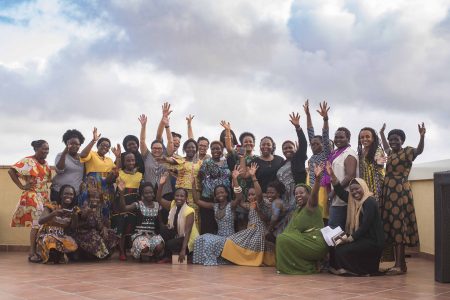
AWDF welcomes a generous, transformative gift from MacKenzie Scott
24 March 2022
The African Women’s Development Fund Board and Team are thrilled to receive a generous gift from American philanthropist MacKenzie Scott.
As Africa’s first women’s fund, AWDF has awarded over USD 50 million in grants across Africa and beyond in the two decades since we started operating, all while providing critical capacity-strengthening, movement-building, and narrative change support to African feminist groups. We are humbled by the recognition of the impact of our grantee partners and the wider African feminist movements towards disrupting the patriarchal status quo on the continent, and by the trust in AWDF’s critical role in supporting that change.
When it comes to philanthropy, direct funding to feminist organisations is notoriously low and usually comes with directions or restrictions on when, where, how and with whom funding can be used, leaving little room to do and support transformative work in a way that is innovative and inclusive. We therefore deeply appreciate that MacKenzie Scott’s donation to AWDF is both a sizeable and unrestricted donation.
Françoise Moudouthe, CEO of AWDF, says: “I am amazed by how much AWDF has been able to do since its inception, with the support from a generous community of donors. Yet, we are still only able to fund less than 15% of the eligible applications we receive, and the fact that only about 10% of our resources are unrestricted has kept me up at night more than once, not least because I know we fare much better than other African women’s rights groups in that respect. So, for AWDF to receive an unrestricted gift that is about the size of our current annual budget is a huge, exciting opportunity.”
With our excitement comes a great responsibility to our partners and the constituencies we serve. Listening to the priorities they have identified while consulted as part of our ongoing strategy development process, we look forward to leveraging these new resources to go further and deeper than we have been able to so far.
We will prioritise reaching more diverse and marginalised women and gender-non-conforming people across Africa. We will develop even more agile, inclusive and responsive ways to support feminist innovation and transformation. And we will invest in the long-term sustainability of movements as well as our own organisational resilience, so we can sustain and bring to scale the change we will have seeded beyond the coming few years.
There is comfort in knowing that MacKenzie Scott’s gift will enable AWDF to put these ideas into concrete action without delay. We can’t wait to work with our partners and demonstrate the power of collective African feminist imagination!
[/tp]
[tp lang=”fr” not_in=”en”]
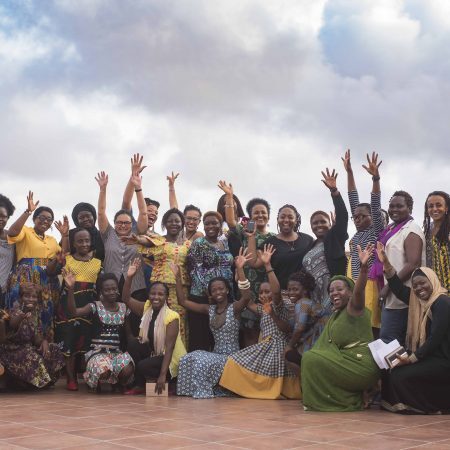
AWDF reçoit un don généreux et révolutionnaire de MacKenzie Scott
24 mars 2022
L’équipe de l’AWDF ainsi que son conseil d’administration sont ravis de recevoir un don généreux de la philanthrope américaine MacKenzie Scott.
En tant que premier fonds féminin d’Afrique, le Fonds Africain pour le Développement des Femmes (AWDF) a accordé plus de 50 millions de dollars de subventions à travers l’Afrique et au-delà au cours des deux décennies qui ont suivies le début de ses activités, tout en fournissant un soutien essentiel au renforcement des capacités des groupes féministes africains, à la construction de nouveaux groupes ainsi qu’au changement du discours narratifs de ceux-ci. Nous sommes honorés par la reconnaissance de l’impact de nos partenaires bénéficiaires et des mouvements féministes africains en général pour changer le statu quo du patriarcat sur le continent et par la confiance au rôle essentiel de l’AWDF pour soutenir ce changement.
En matière de philanthropie, le financement direct des organisations féministes est très faible et s’accompagne généralement de directives ou de restrictions sur le moment, le lieu, la manière et les personnes avec lesquelles le financement peut être utilisé; ce qui laisse peu de choix pour réaliser et soutenir un travail transformateur de manière innovante et inclusive. C’est pourquoi nous apprécions profondément que le don de MacKenzie Scott à l’AWDF soit à la fois un don important et sans restriction.
Françoise Moudouthe, directrice de l’AWDF a déclaré à cet effet : « Je suis stupéfaite de tout ce que l’AWDF a pu faire depuis sa création grâce au soutien d’une communauté de généreux donateurs. Pourtant nous ne sommes encore en mesure de financer que moins de 15% des demandes admissibles que nous recevons, et le fait que seulement 10% de nos ressources soient sans restrictions m’a empêché de dormir plus d’une fois, notamment parce que je sais que nous nous en sortons beaucoup mieux que d’autres groupes de défense des droits des femmes à cet égard. Ainsi, le fait que l’AWDF reçoive un don non restrictif qui représente à peu près la taille de notre budget annuel actuel est une opportunité énorme et excitante.»
Notre enthousiasme s’accompagne d’une grande responsabilité envers nos partenaires et les groupes que nous servons. En écoutant les priorités qu’ils ont identifiées lors des consultations menées dans le cadre de notre processus continu de développement de la stratégie, nous sommes impatients d’utiliser ces nouvelles ressources pour aller plus loin que nous n’avons pu le faire jusqu’à présent.
Nous nous efforcerons d’atteindre prioritairement les femmes les plus diverses et les plus marginalisées, ainsi que les personnes non conformes au genre dans toute l’Afrique. Nous développerons des méthodes encore plus dynamiques, inclusives et réactives pour soutenir l’innovation et la transformation féministes. Et nous investirons dans la durabilité à long terme des mouvements ainsi que dans la résilience de notre propre organisation, afin de soutenir et de mettre à niveau le changement que nous aurons initié au-delà des quelques années à venir.
Il est réconfortant de savoir que le don de MacKenzie Scott permettra à l’AWDF de concrétiser ces idées sans délai. Nous avons hâte de travailler avec nos partenaires et de démontrer le pouvoir de l’imagination collective féministe africaine!
[/tp]
Funding frontline women-led organisations to redefine community impact
Funding frontline women-led organisations to redefine community impact
THE CASE OF IMPROVING WOMEN’S HEALTH OUTCOMES IN KENYA
Written by: Dinnah Nabwire, Knowledge Management Specialist, AWDF
In 2020, over 300 million African women were directly affected by Noncommunicable Diseases (NCDs) and 2.4million of these had suffered from at least one form of cancer.
Across most African countries, addressing the burden for cancers and other forms of NCDs remains undermined by low national health care budgets and intervention packages that do not intricately include the needs of most affected populations.
In our work, the African Women’s Development Fund (AWDF) has found that women-led organisations, the majority of which are situated in and across hard-to-reach, under-served and marginalised parts of communities continent-wide, are well-positioned to address the growing burden of NCDs. However, they lack adequate resources to build alliances, co-create innovative approaches built on their years of community work experience and lessons, champion advocacy and implement the service delivery needed to achieve inclusive health outcomes for women.
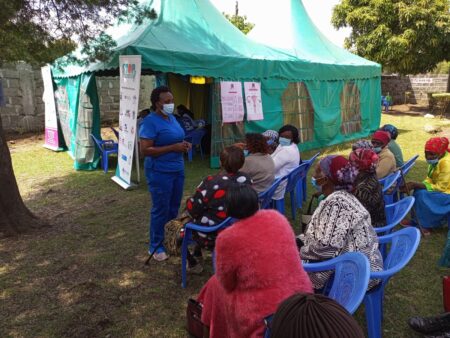 In 2021, AWDF extended funding to one of such powerful frontline organisations, Women4Cancer Early Detection and Treatment, a community-based women-led organisation that addresses cervical cancer across sixteen counties in Kenya. In the following sections, we present four levels of unique value addition from resourcing community-level women-led organisations using examples from our work with Women4Cancer Early Detection and Treatment.
In 2021, AWDF extended funding to one of such powerful frontline organisations, Women4Cancer Early Detection and Treatment, a community-based women-led organisation that addresses cervical cancer across sixteen counties in Kenya. In the following sections, we present four levels of unique value addition from resourcing community-level women-led organisations using examples from our work with Women4Cancer Early Detection and Treatment.
Designing sustainable models that address underlying drivers of health inequities
In Kenya, cervical cancer kills nine women a day and is almost entirely caused by infection from the Human Papilloma Virus (HPV). While early detection and treatment is a clear path to elimination, HPV vaccines for young girls and boys can prevent infection by the virus in the first place. However, women and girls do not equitably access and utilise this opportunity due to a range of barriers.
According to Elizabeth Mbuthia, the Head of Programmes at Women 4 Cancer Early Detection and Treatment, most women targeted in the awareness sessions often lacked resources (transport and hospital fees) to access screening services at various health centres. Other critical barriers were significant numbers of women lacking information about screening opportunities, not seeing the importance of screening since they presented no signs or symptoms, while others cited lack of cervical cancer screening services at community level health centres when they visited.
With funding from AWDF, Women4Cancer Early Detection and Treatment sought to address these barriers. The team was able to provide free screening that resulted in increased numbers of women who know their status – a crucial step in maximising prevention and treatment for cervical cancer.
The organisation uses a community-driven intervention model that targets girls aged 10-14 and women. Over the past ten years, they have built reciprocal relations with the Ministry of Health, County Departments of Health, Sub- County Health Management teams, community health workers, opinion leaders, caregiver groups and schools with whom they collaboratively design and deliver interventions.
Champions who mainly consist of community health workers, particularly women, are trained and equipped with skills and tools to educate communities on the prevalence of cervical cancer, assess barriers to effective screening and popularise the opportunity for early treatment. During health camps, the project teams and volunteer nurses are attached to healthcare workers in the target health facilities to monitor the quality of services and support documentation and learning.
From the pre- and post-assessments, a significant increase in the numbers of women getting screened across health centres targeted by the project was recorded during the intervention period. At Bahati Sub-County Hospital in Nakuru North, screening rates grew from 13 in June 2021 to 241 in July 2021 following the community education activities coupled with free screening, on-site treatment and referral health camps. Similar trends were registered in the Nakuru North Sub-County Engashura, Kabatini and Dundori Health centres.
Tapping into the unique opportunity to integrate intervention lessons
At the project’s inception, the Women4Cancer Early Detection and Treatment team learnt that Nakuru County had adopted the school-based strategy for delivering the HPV vaccine for girls aged 10-14 years. Low vaccine uptake was registered when learners returned home for holidays or during short breaks and an increase in the uptake when schools resumed.
Based on these observations, the project team guided activity planning and scheduling to maximise holidays and breaks. Specific messaging was integrated to target community influencers and men as parents or guardians to support the participation of women and girls in project activities. The result was the sub-county recording a significant increase in the numbers of eligible girls taking up the HPV vaccine at the end of the intervention.
A partnership was initiated between schools and Engashura Health facility to co-host vaccination outreaches in neighbouring schools which further increased screening and HPV vaccination uptake outcomes. It also enabled the health facility to replicate similar initiatives in the sub-county. Integrating lessons during implementation ensured that the intervention model adjusts to address emerging needs, reaches excluded populations and maximises screening, testing and referrals for the navigation treatment program among women and girls manifest positive results.
Linking community needs to influence policy and programming at the county, national, and global levels.
As host of the STOP Cervical Cancer Technical Working Group secretariat, the Women4Cancer Early Detection and Treatment convenes over thirty partners, including the Ministry of Health’s National Cancer Control Programme, and nonprofits committed to addressing cervical cancer. The organisation is also an HPV vaccine technical support partner in the Advocacy, Communications and Social Mobilisation Technical Working Group (ACSM-TWG) at the National Vaccines and Immunisations Programme, Ministry of Health in Kenya.
The project team continually utilises these platforms to highlight health system challenges from the communities where they work and actively lobby government and key actors to prioritise emerging issues and barriers. During the 2019 launch of the integration of the HPV vaccination to the routine immunisation schedule, Women4Cancer Early Detection and Treatment facilitated the participation of one of the project champions to share the story of her survivorship. She also called upon policymakers who included the President of the Republic of Kenya to subsidise screening costs for more women to know their status and access navigation programs early. The project team uses their membership on these national and regional platforms to follow up these asks.
Impacting key populations and often excluded women and girls
The project team collaboratively works with the Sub-County Health Management Teams (SCHMT) in the different counties to report into the cancer registry databases like the Kenya Health Information System (KHIS). This ensures that national databases capture necessary details about women’s health and their multiple vulnerabilities crucial for health interventions that leave no one behind.
Moreover, in Kenya, it is estimated that female sex workers are almost ten times more likely to contract HIV than non-sex workers – yet, women living with HIV have a substantially increased risk for cervical cancer compared with women without HIV infection.
Before receiving funds from AWDF, Women4Cancer Early Detection and Treatment had worked with female sex workers without deliberate disaggregation. However, with the funds, they scaled up this work through deliberately targeting and training their leadership who subsequently mobilised their colleagues to participate in screening activities. The majority of the champions engaged by the project team had been trained in other health issues, particularly HIV and AIDS, which made it easy to highlight the integration between HIV and Cervical Cancer.
Like Women4Cancer Early Detection and Treatment, hundreds of African women-led community-level organisations are front lining initiatives that promote holistic outcomes for women’s health. Placing funds in the hands of community-level women-led organisations means generating community-driven strategies that reach most marginalised populations and build on resident resources to deliver sustainable high impact interventions.
Diana Louise Ofwona
Diana Louise Ofwona
Diana Ofwona is the Resident Representative of UNDP in Niger since April 2019. As the main interlocutor with the Government of Niger on behalf of UNDP, her key assignment is to provide substantive leadership for sustainable and inclusive development, with particular focus on AU Agenda 2063 and UN Agenda 2030. She is also responsible for the formulation of the UNDP Country Strategy for Niger, mobilising resources and partnerships for Niger’s development agenda, and providing strategic guidance and oversight for UNDP’s operations in Niger.
In her current assignment, she is also in charge of leading UNDP Niger’s strategy for the Sahel, the Lake Chad Basin and Liptako Gourma Regions in mitigating the effects of violent extremism, notably the Boko Haram and ISWAP1 insurgencies, through a robust, coherent and integrated approach to security, humanitarian and development challenges under the $100m Regional Stabilisation Programme.
A graduate of the University of Nairobi (M.A), Diana has over 30 years’ work experience in government, private sector, international NGOs, the Academia and the United Nations. Prior to her current appointment, Ms. Ofwona held, from 2015 to 2018, the position of Regional Director of the United Nations Entity for Gender Equality and the Empowerment of Women (UN Women), in charge of all countries in West and Central Africa (WCAR). Ms. Ofwona has held other senior positions in the UN across three continents (Africa, the Caribbean and North America), notably as:
1. Regional Director, UNIFEM Central Africa based in Kigali, Rwanda (2010-2015).
2. Special Advisor to the UN Assistant Secretary General/UNDP Regional Director for Africa based in New York, USA (2006-2008).
3. UNDP Deputy Resident Representative based in Niamey, Niger (2004-2006).
4. UN Policy Analyst for Southern Africa based in Pretoria, South Africa (2002-2004).
5. Policy Analyst, UNDP in Trinidad and Tobago (June to September 2002) – UNDP Trainee.
6. UN Regional Advisor for the Great Lakes Region based in Kigali, Rwanda (2000-2002).
A leader and senior international development practitioner, she has proven capacity to shape and lead socio-economic policy. Ms. Ofwona has served on several high-level boards and committees, notably the UN high-level Strategy and Management Review Panel commissioned to develop a new strategy for UNDP in Africa. She also served on the Boards of the North-South Institute (Canada), the Makerere Female Scholarship Foundation (Uganda) and the MTN Foundation (Rwanda).
Diana is a life member of the International Association of Students of Economics and Business (AIESEC) and the Lions Club International.
Call for Proposals: Main Grants and KASA!
Call for Proposals: Main Grants and KASA!
[tp lang=”en” not_in=”fr”]
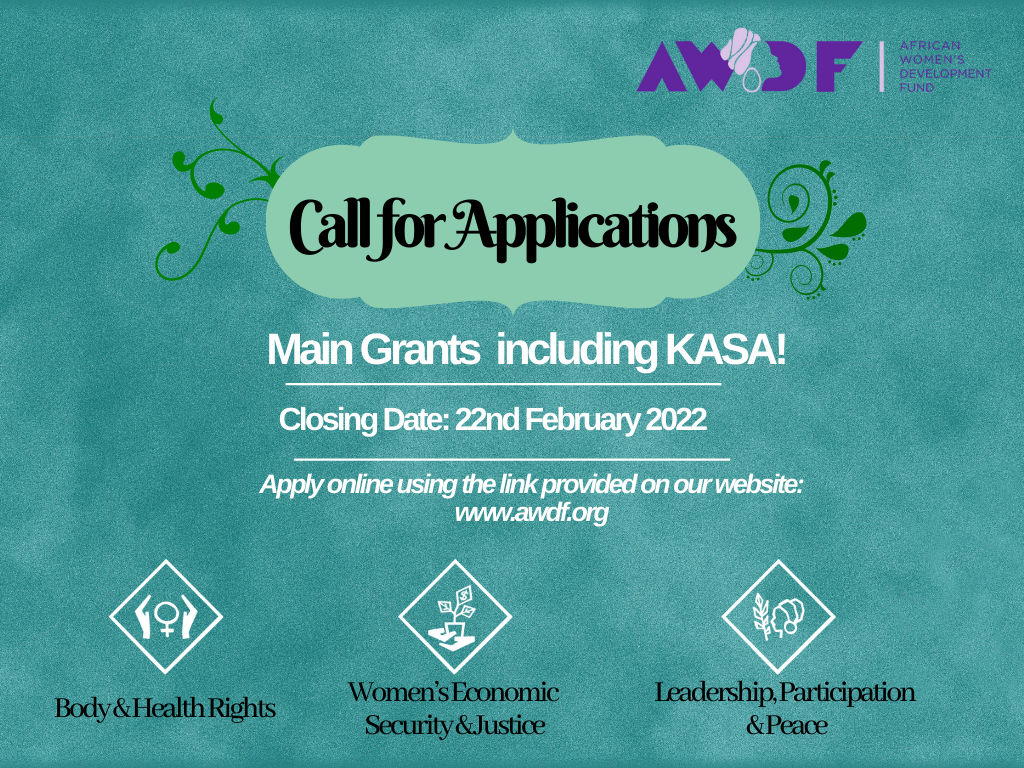
From January 25th 2022, AWDF will be accepting proposals from interested women led organisations registered and working in Africa. AWDF defines a woman led organisation as an organisation whose board chair and executive director are both women. Also at least 70% of the board and staff members of the organisation are women. The call ends on 22nd February 2022.
For this round of grant making we will prioritise the following:
- Organisations working in French speaking African countries
- Organisations working in two or more African countries
- Young women led organisations
- LBTQI led organisations
- Women living with disabilities led organisations
We have two funding streams you can apply to:
- Main Grants for women led organisations registered and working in Africa and
- Kasa! for women led organisations registered and operating in Ghana, Nigeria and Senegal and working on sexual violence issues
Applicant Guidance Note – Main Grants
- The Main grants support work around all of AWDF’s three thematic areas
- Organisations located in Ghana, Nigeria and Senegal, working on sexual violence can apply for both the Main grant and the Kasa fund
- Organisations working in two or more countries are encouraged to apply
- For the main grant, an organisation working in two or more countries can apply for a maximum of USD100,000 for one year. With this you can apply for only a one-year grant
- For the main grant, an organisation working in one country can apply for up to a maximum of USD50,000 per year for two years
- Please note that AWDF can provide funding to a maximum of 50% of an applicant organisation’s confirmed income for 2021. For example, if your confirmed income for 2021 was USD50,000, you can apply for a maximum of up to USD25,000 per year
Applicant Guidance Note – Kasa!
- The Kasa! grant is specifically for work around sexual violence. The Sexual Violence Research Initiative defines sexual violence here https://www.svri.org/research-methods/definitions .
Sexual violence/abuse refers to any sexual act or attempt to obtain a sexual act, or unwanted sexual comments or acts to traffic, that are directed against a person’s sexuality using coercion by anyone, regardless of their relationship to the victim, in any setting, including at home and at work.
- Please DO NOT apply for the Kasa! grant if your organisation is not based in nor working in Ghana, Nigeria or Senegal
- Organisations located in Ghana, Nigeria and Senegal, working on sexual violence can apply for both the Main grant and the Kasa! fund to work on different aspect of sexual violence or sexual violence and another theme.
- For organisations in Ghana, Nigeria and Senegal who intend to apply for the Kasa! grant, please note that the Kasa! grant is specifically for work around sexual violence issues in Ghana, Nigeria and Senegal
- For the Kasa! grant, you can apply for a grant of up to USD30,000 per year if your 2021 confirmed income can support that
- For the Kasa! grant you can apply for grant up to a maximum of 3 years.
- Please note that AWDF can provide funding to a maximum of 50% of an applicant organisation’s confirmed income for 2021 per year. For example, if your confirmed income for 2021 was USD20,000, you can apply for a maximum of up to USD10,000 per year
Please note that we expect to receive over 1000 applications and therefore are only able to contact successful applicants once the review process is completed – successful applicants will hear from us in June 2022.
If you are interested in applying, please read the Applicant Guidance Document as it contains essential information to help you through the process. If, after reading the applicant guidance document, you are interested in hearing more about the AWDF application process and would like to join one of our Applicant Webinars, please REGISTER HERE . The French applicants’ webinar will be held on Tuesday February 1st 2022 at 10.00am GMT and the English applicants’ webinar will be held on Wednesday the 2nd of February 2022 at 10.00am GMT.
To apply for a grant from AWDF please complete the application process by clicking the link below
AWDF GRANTS APPLICATION PORTAL
Guidance for the online platform can be accessed here
Click here to read our Frequently-Asked-Questions (FAQs)
[/tp]
[tp lang=”fr” not_in=”en”]
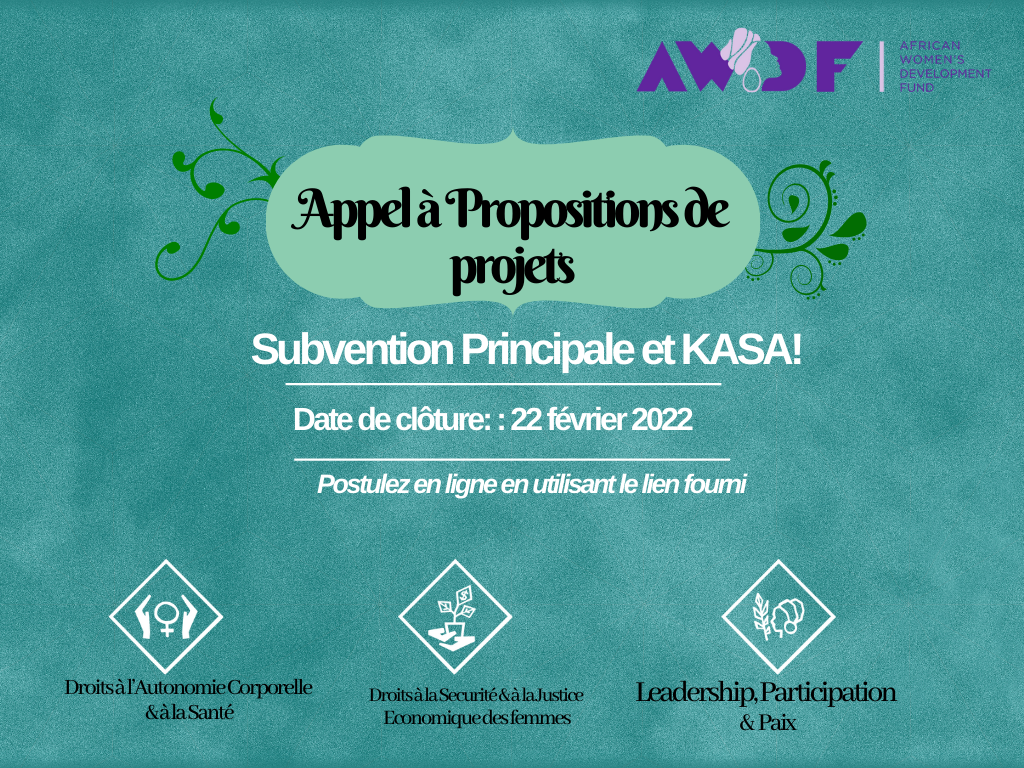
À partir du 25 janvier 2022, l’AWDF acceptera les propositions de projet d’organisations dirigées par des femmes africaines enregistrées et travaillant en Afrique. L’AWDF définit une organisation dirigée par des femmes, une organisation ayant une femme comme directrice exécutive et comme présidente du conseil d’administration et dont la majorité (au moins 70%) de l’ensemble des membres du conseil d’administration et du personnel sont des femmes. L’appel est ouvert jusqu’au 22 février 2022.
Pour ce cycle de subvention, nous prioriserons les demandes provenant :
- des organisations travaillant dans les pays africains francophones
- des organisations travaillant dans deux ou plusieurs pays africains
- des organisations dirigées par les jeunes femmes
- des organisations dirigées par les LBTQI
- des organisations dirigées par les femmes vivant avec le handicap
Nous avons deux volets de financement auxquels vous pouvez présenter une demande :
- La subvention principale est destinée aux organisations dirigées par des femmes africaines enregistrées et opérant en Afrique.
- La subvention Kasa! est pour les organisations dirigées par des femmes africaines enregistrées et opérant au Ghana, au Nigeria et au Sénégal et travaillant dans la lutte contre la violence sexuelle.
Informations pour les organisations demandeurs de la subvention principale
- La subvention principale soutient les projets répondant aux trois domaines thématiques de l’AWDF
- Les organisations basées et opérant au Ghana, au Nigeria et au Sénégal, qui travaillent dans la lutte contre la violence sexuelle peuvent demander à la fois la subvention principale et la subvention Kasa!
- Les organisations travaillant dans deux ou plusieurs pays africains sont encouragées à présenter une demande.
- Pour la subvention principale, une organisation travaillant dans deux ou plusieurs pays africains peut demander un montant maximum de 100.000 USD pour un an. Avec cela, vous pouvez demander une subvention d’un an seulement
- Pour la subvention principale, une organisation travaillant dans un pays africain peut demander une subvention d’un montant maximum de 50 000 USD par an pour deux ans
- Veuillez noter que l’AWDF peut fournir un financement jusqu’à 50 % du revenu annuel confirmé pour 2021 d’une organisation. Par exemple, si votre revenu annuel confirmé pour 2021 était de 50 000 USD, vous pouvez demander un montant maximum de 25 000 USD pour un an.
Informations pour les organisations demandeurs de la subvention – Kasa!
- La subvention Kasa! est spécifiquement destinée aux interventions sur la violence sexuelle. L’Initiative de recherche sur la violence sexuelle définit la violence sexuelle comme suit https://www.svri.org/research-methods/definitions .
La violence sexuelle/l’abus sexuel désigne tout acte sexuel ou tentative d’obtenir un acte sexuel, ou les commentaires ou les actes sexuels non désirés ou la traite, qui sont dirigés contre la sexualité d’une personne en utilisant la coercition par quiconque, quelle que soit sa relation avec la victime, dans n’importe quel contexte, y compris à la maison et au travail.
- Veuillez NE PAS soumettre une demande pour la subvention Kasa! si votre organisation n’est pas basée au Ghana, au Nigeria ou au Sénégal.
- Les organisations basées et opérant au Ghana, au Nigeria et au Sénégal, qui travaillent dans la lutte contre la violence sexuelle peuvent demander à la fois la subvention principale et la subvention Kasa! pour travailler sur différents aspects de la violence sexuelle et un autre thème
- Pour les organisations au Ghana, au Nigeria et au Sénégal qui ont l’intention de présenter une demande pour la subvention Kasa! veuillez noter que Kasa! est une subvention spécifiquement destinée aux interventions sur la violence sexuelle au Ghana, au Nigeria et au Sénégal.
- Pour la subvention Kasa! vous pouvez demander une subvention pour un montant maximum de USD30,000 par an si votre revenu annuel de 2021 confirmé peut soutenir la demande de ce montant maximum.
- Pour la subvention Kasa! vous pouvez demander une subvention pour une durée maximum de 3 ans.
- Veuillez noter que l’AWDF peut fournir un financement jusqu’à 50 % du revenu annuel confirmé pour 2021 d’une organisation par an. Par exemple, si votre revenu confirmé pour 2021 était de 20 000 USD, vous pouvez demander un montant maximum de 10 000 USD par an.
Pour ce cycle de subvention, nous prévoyons de recevoir plus de 1 000 demandes et que, par conséquent, nous ne pourrons contacter les organisations retenues qu’une fois le processus d’évaluation terminé. Les organisations retenues seront contactées en juin 2022.
Si vous souhaitez soumettre une demande, nous vous invitions à lire attentivement le guide de soumission de subvention, qui contient les informations essentielles pour vous aider dans votre démarche
Pour en savoir plus sur le processus de demande de subvention de l’AWDF, nous vous invitons à participer à l’un de nos webinaires sur cet appel à propositions. Le webinaire en français se tiendra le 01 février 2022 à 10h00 GMT et le webinaire en anglais se tiendra le mercredi 02 février 2022 à 10h00 GMT. Pour rejoindre le webinaire, veuillez-vous INSCRIRE ICI.
Pour soumettre une demande de subvention à l’AWDF, veuillez remplir le formulaire de demande en ligne en cliquant sur le lien ci-dessous.
PORTAIL DE DEMANDE DE SUBVENTIONS DE L’AWDF
Cliquez ici pour lire notre Foire-aux-questions-cycle-49
Pour accéder au guide d’utilisation du portail en ligne de demande de subventions de l’AWDF, veuillez cliquer ici
Cliquez ici pour vous inscrire au webinaire
[/tp]
Consultancy Opportunity: Communications Accelerator
Consultancy Opportunity: Communications Accelerator
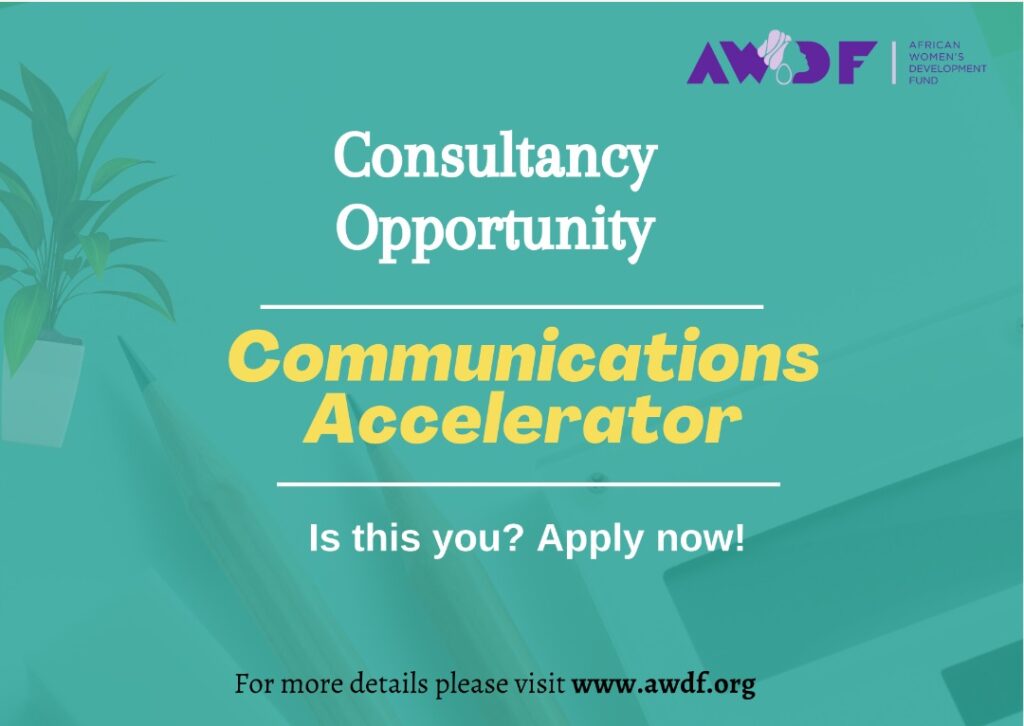
The African Women’s Development Fund was established in June 2000 as an Africa-wide philanthropic, grant-making initiative to support the realisation and fulfilment of African women’s rights through the funding of autonomous women’s organisations. To achieve this, AWDF supports African women’s organisations leading the charge for women’s rights and gender equality in Africa by: mobilising and advocating for increased and improved financial resources to support gender equality initiatives led by African women (through resource mobilisation and philanthropic advocacy); funding organisations that work towards the promotion of women’s rights and gender equality (through grantmaking); strengthening African women’s rights and feminist organisations and leaders (through capacity building and technical support); supporting African feminists as they learn from each other’s work and build solidarity (through knowledge- and movement-building); and amplifying the voices of, and changing the narrative around African women and feminists (through communications). AWDF is currently in the process of developing a new strategic framework to guide its work in the next decade.
We are committed to improving and deepening our work to change the narrative around African women’s agency, to expand public understanding of what gender justice means for Africa, to amplify the voices of African feminists, and to provide the best possible representation of the work and impact of AWDF’s team and grantee partners. Building on the recommendations of a Communications Audit undertaken in 2018, AWDF is now recruiting a consultant (or teams of consultants) to act as a Communications Accelerator – a communications strategist and expert who can assist the team in ensuring our communications strategy, brand and voice, contents, practices and competencies are aligned with our new strategic vision.
The Communications Accelerator’s work will run concurrently with, and feed into AWDF’s overall strategic planning process. The Communications Accelerator will help keep momentum and move from talk to action on ideas that have been raised in the past, bring in fresh ideas, help identify and fill key competency gaps, and review progress. The role is about supporting the Communications team to transform, not tweak, their approach and work for improved impact. The approach will be participatory with activities that encourage ownership.
This assignment will last 6 months, and will ideally start around mid-February 2022. We envisage that 60 to 75 working days will be necessary to complete the assignment.
The deadline for submission of proposals is 15 February 2022.
For more details about the consultancy, the preferred profile of the consultants, and how to apply,
please download the full Terms of Reference here.
In line with AWDF’s mission, qualified and interested women from Africa or from African descent are encouraged to apply.
